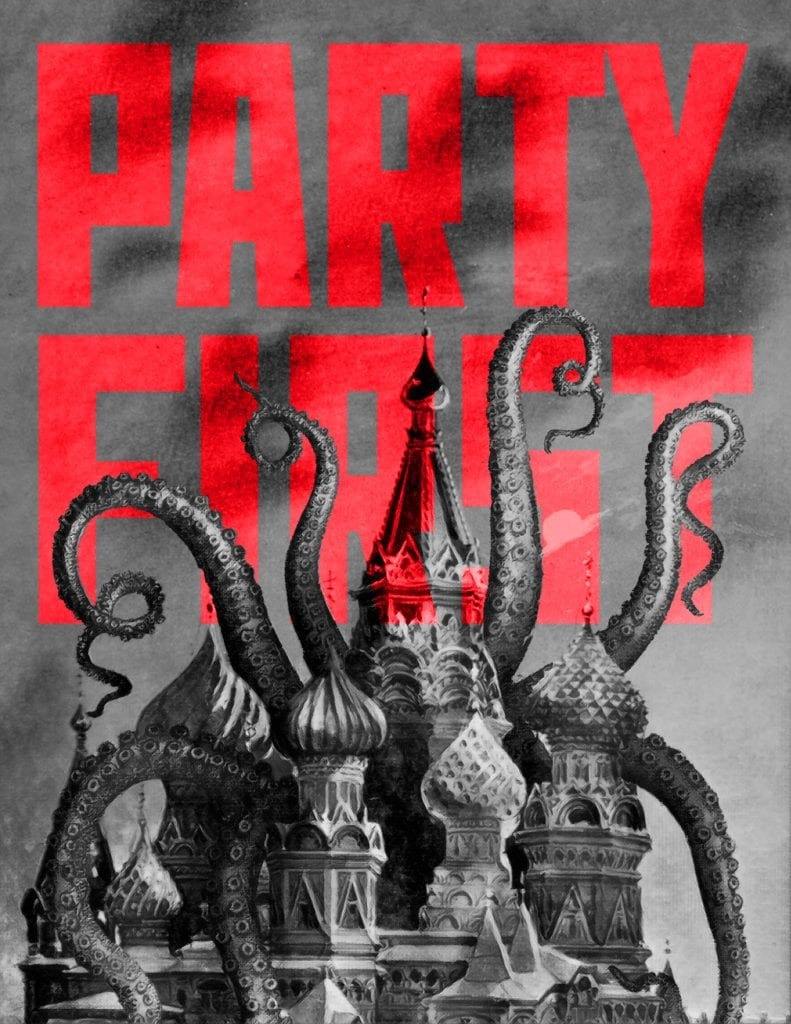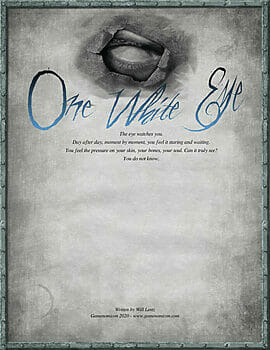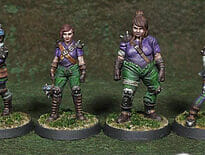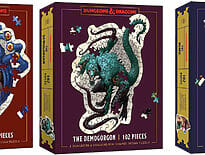Every month, Geek Native’s Patreons vote for a publisher, creator or curator in the RPG industry to feature in the Spotlight.

The goal is to reward and thank patrons and highlight the smaller but equally important contributors to this hobby and labour of love.
For August, Gen Con and Edinburgh Festival month, patrons voted for Gamenomicon.
Will Lentz, owner, lead designer, community manager and founder of Gamenomicon, has been kind enough to offer his time.
In this interview, we dare a little close to Lovecraft controversies and talk about All4Two mechanics and the Ozarks. I’m embarrassed to say this Scottish blogger had never heard the word “Ozarks” before…
A Gamenomicon interview
Let’s start at the start, ask one polite intro question and then be a devil by tossing an awkward one in straight away!
Who are Gamenomicon?
Well, legally speaking it’s just me. I have, however, brought in a few friends and acquaintances on various projects. In fact, Gamenomicon officially started because I was cooking up a game for fun with Brett Zeiler (which eventually became Party First). He was a great design partner but didn’t want to mess with the publishing part, so that lead me to filing for the LLC. These days I’ve also been joined on a couple of projects by Jerod Leopuld, who has been the biggest fan of Party First. Additionally, he’s the creator of the first game that I acted as just publisher for – Goblyn Market.
How do you think RPG publishers should handle Lovecraft’s controversies?
Whoo boy, that is a loaded topic even in itself. I think in a lot of ways that’s up to each individual publisher. In a general sense, I feel that Lovecraft himself is at a far enough remove in time (and life) that the mythos has grown far beyond him in a lot of ways and he certainly isn’t benefiting monetarily from things these days. I think that folks embracing his more narrowminded views in the gaming realm is relatively rare that I see – at least in the context of doing so directly through mythos inspired projects. And in broader pop culture you can look at projects like Lovecraft Country which really expand things in order to help the audience grapple with those issues from new perspectives. So, if a publisher (or player for that matter) would rather not engage with it, I think that’s fine for them, but likewise, if a publisher wants to use, remix, expand, and so on, I think there’s ample room to do so.
What have you learned about being a small publisher as you’ve run the company?
Ha, I think one of the biggest personally is time management. Or rather, perhaps I’ve learned that I’m not the best at it? When you’re mostly just accountable to yourself, it can be easy to let timelines slip. So that’s an item that I think is really important for small publishing, especially when many folks are doing this as a sideline to a standard day job, which crunches the available time even more.
Another item with that is that I’ve learned it’s really tough to get out there and build a name and an audience for yourself. There’s a ton of us trying to do it, so in order to stand out from the crowd and really succeed at it, I think you need a certain amount of natural charm and a lot of time to get out there and get yourself in front of people – because it’s almost certainly going to boil down to you personally as small/indie press rather than the concept of the company as a whole.
What do you think you’re best known for, and what do you like to be known for?
I suppose this one depends on exactly what kind of criteria we’re using for that metric. On the one hand, my Edgar Allen Poe inspired solo game One White Eye and the SRD for the system it runs on, the Second Guess System, are certainly my most purchased and downloaded docs. On the other hand, I’m aware of maybe half a dozen different actual plays that folks have done using the holiday romance game, Warmer in the Winter. I’m not sure which really has the biggest total awareness.
Good RPGs and favourite systems
Will’s always struck me as being ahead of the trend. It was the Cold War supernatural RPG of Party First that put Gamenomicon properly on my radar and a review then of the games published suggested as much.
What makes a good game, and do you think that’ll change as technology and culture change?
That’s so subjective that it can be difficult to tackle. Some games that I really like, say 7th Sea Second Edition or Twilight Imperium rub others the wrong way. On the other hand, I know others really get a kick out of Mork Borg, but it doesn’t really do all that much for me – sacrilege to say, I know.
So in my subjective criteria, I think part of what makes a good game is that the rules structure flows in a mostly organic way. That doesn’t mean that it has to be simple, I mean I said above that I love Twilight Imperium, but the rules have to not feel arbitrary. And that’s also not to say arbitrary in the way that a particularly hardline GM may make absolute decrees on the fly, but rather that the rules need to feel like they flow in a way that offers interesting choices and reinforces the genre of the game that they’re a part of rather than having a rule simply for the sake of having a rule.
For examples, it’s maybe easiest to use one from the card gaming world, the brand new Lorcana. Take deck construction there for instance. You can only use two inks (colors/card factions) when constructing your deck. Is there any particular reason for this? Sure, in the meta sense, it keeps people from cherry picking the best card of every faction, but in the context of the actual play or world or the like? Nope. It’s just an arbitrary restriction stapled on top of the rest of the rule set. Don’t get me wrong, I’m enjoying Lorcana, but that’s one of the clearest examples I had at hand of what I mean.
Of course, sometimes things can go the other way. I enjoy 7th Sea Second Edition, but I do have to admit that it even gave me pause with the system of gaining and spending raises. It was very different than what I had run into before that and not nearly as easy to wrap my brain around as something like a classic d20 roll to determine pass or failure. It finally clicked for me eventually while playing Android: Netrunner of all things, though, when I realized that 7th Sea is really an economic game. Much like Netrunner, I’m trying to find the most efficient use of the resources that I have while my opponent is trying to bleed them out inefficiently. Sure, the GM isn’t strictly my opponent, but the economic back and forth of gaining and spending resources on results vs opponents and complications and such suddenly made much more sense to me. The “big damn heroes” as they phrase it don’t just pass or fail, they try to do as much as possible at all times until they’re just stretched too thin. That really worked for me.
Can you please tell us about the All4Two mechanics?
Ah this one is Jerod’s brain child for the game he designed, Goblyn Market. In short, it’s kind of a riff on the gag that the goblins aren’t really numbers oriented creatures, so at most they can count to 2. So this plays out in two ways in the system. Basically, it’s a d2 dice pool, so each individual die has the chance of being 0 or 1 and then you tally up the number of successes, but of course, that caps out at 2. So if you get 4 successes, the goblyns still just call it 2. The system then has tiers of failure at 0 (called Not 1), a blunder at 1, and full success at 2.
Will you also continue to write Powered by the Apocalypse games? I notice Warmer in the Winter, which uses the system, gets five stars at DriveThruRPG.
Yeah, Warmer in the Winter has been a bit of a small success. When people hear about it, it seems that they really connect with the concept. Something about those decidedly cheesy Hallmark movies lends itself well to people quickly grokking how to set up a short story to tell in a tongue in cheek sort of way. Part of that, I think, is the PbtA system, which I would honestly really just call a genre emulator. And it turns out that Hallmark movies are a genre with very identifiable tropes to work with.
So, that said, if I were to dip back into PbtA, I think I would need to identify another genre with some really solid tropes to work with – bonus points if it’s a genre that is a bit overlooked in the gaming space. I admit, a somewhat spicier rendition of much of the core of Warmer in the Winter but styled as more of a Bridgerton/ Regency Romance homage has been on my mind before. Hmmm… maybe some elements of Outlander could be worked in as well…. Dangit! Now you have me thinking!
Wholesome and not so…

Warmer in the Winter is a five star best-selling RPG on DriveThruRPG and has a twist. It’s not about slaying zombies. It’s about finding love in the vein of Gilmore Girls. It’s the sort of thing Hallmark might like.
… not so the winter of the Twilight World.
What happened at Christmas Con and Warmer in the Winter?
Not nearly as much as I wish! My wife is a big fan of Hallmark Christmas movies, so she noticed that over this summer there was a Christmas Con for the first time in Kansas City, the home of Hallmark. So we went up and had a good time meeting various actors and sitting in on some panels. I wish, however, that I’d thought early enough about applying to be a vendor there. I’d have been the only one offering something like a tabletop roleplaying game, so who knows if it would have gone over well. I did, however, take a few copies with us to give to a couple of the actors we really like, and they seemed bemused overall. One of their assistants was intrigued and asked where they could buy more copies to give as gifts, though!
Unlike the Hallmark wholesome Warmer in the Winter, you’ve also got Party First and the Twilight World. Can you please tell readers about those and whether you plan to return to the Twilight World?
Oh absolutely! Jerod would never let me hear the end of it if I tried to move on from the Twilight World. He’s in a bit of a unique place in that he’s a gaming friend that I’ve known for many years due to card gaming, but he personally has been a big RPG fan for ages. And then when I launched Party First, he became the number one fan of that world and system and very quickly was messaging me about ideas for a variety of adventures and supplements. This culminated most recently in him co-designing Party First: Twilight War.
Next up, he’s been working on a series of three interconnected adventures that can be played solo or combined to tell an overarching saga about Project Morning Star. The first of these, Longshot Behind the Radiation Curtain at the Commonwealth Casino, is already out and is just chock full of 80s goodness. I’m currently working on layout for the second, Decommissioned Disavowed Counteragent Red Herring Blues, while the third is in playtesting at the moment.
Beyond those projects, I’ve been slowly working on fleshing out some ideas that Brett and I had during initial Party First design so that it can become a full new starter book centered on the United States analogue, the Federated States, and the extreme capitalist dystopia that it is in the Twilight World. It’s intended to use the much of the same base rules so that things like adversaries could easily be ported over, but to also incorporate a variety of tweaks to make the book its own thing as a fully stand-alone starting point. Think of it a bit like the Khitai book for the 7th Sea line of games. It will, rather appropriately, be named Profit First.
You’ve also several solo games, and Geek Native has been tracking the rise of solo games. Have you seen that, too or perhaps solo games have always been popular?
I think there’s been a market for them in some fashion for ages. The Fighting Fantasy books started back in the early 80s, and even as a kid I remember being deep into Choose Your Own Adventure books in the late 80s/early 90s, and I think I would argue those are solo roleplaying of a form – and I certainly wasn’t the only kid I knew that was into those.
Of course, being stuck at home during the early COVID days surely lead to an explosion in their visibility and popularity. I was one of those people! Of course, I don’t think that was quite the only factor. As more of us are adults with competing demands on our time, it can become harder and harder to carve out the same time as several other players for normal group play. Scheduling is the true big bad of D&D as the aphorisms go. So I think the increased visibility has lead to more people realizing that this is a way to get a roleplaying experience but in a much easier fashion to fit into their schedule.
And on the design side of things, I think solo games appeal to a number of us due to playtesting. If it’s hard to schedule normal game nights consistently, it’s doubly difficult to convince people to playtest a game you have in development over something proven. Solo games then allow us to test and iterate at home and probably in the same environment that we’re writing in. This makes them easier to polish and put out, which increases their visibility in the hobby as well.
Are there any developments or trends in the RPG industry/community that you’ve noticed and would like to explore further?
I think the SRD trend has been continuing to gain more and more steam in the indie and small press space. I think partly there’s been some renewed in interest in that after the mess with D&D licensing, as compared to most of the indie/small stuff being pretty free with Creative Commons licensing. But also I think there’s something to be said for the communities that can be built with carefully planning in system creation and the support documents as well as creating a space to prompt even more interaction that just a jam.
For example, I look at the things that FariRPGs has done with things like Breathless and Guided by Firelights and so on and I’m very impressed – and a teensy bit jealous.
On the flip side, are there any trends, habits or even bad practices that you’re ready to console to the annuals of history?
I know it probably sounds trite, but honestly the only thing that comes to mind quickly is online vitriol. There are a lot of folks that are online all the time and sniping at others can become a bit of second nature. For those of us that have a hard time keeping up with all the circles and really being in the know, this can be a bit daunting to see so much of every time you do try to dig in and be active.
Life as a gamer in the Ozarks

I watched an estate agent’s video series on the Ozarks while researching this interview, and while encouraging people to move to the lakes, the honest fellow also talked about the pitfalls of living there. I was quite moved.
The Ozarks seem to be something out of a TV series that could be Warmer in the Winter in tone and One White Eye, too! I had to ask Will about it.
Has the perception of tabletop games in the Ozarks changed over the years?
Much the same as it has in the rest of the US, I think. When I was a kid, there were a small group of us that would meet up before school to play Magic: the Gathering in the science teacher’s classroom, but as our teenage years went by, several of those folks bowed out to social pressure that those types of games weren’t cool and the group folded. These days, not only has the representation in media with things like Stranger Things become so much more prevalent that people are at least familiar with Dungeons & Dragons when I talk to them but also the internet has made it so much easier to find and communicate with folks that share your interests.
So sure, there are still a large proportion of folks around here into the more standard outdoorsy, rural life that most folks think of for the Ozarks, but gaming folks have much more ability to find each other and stick together than they used to.
What on Earth is the Ozark Howler?
That’s the $64,000 question isn’t it? In short, it’s our local cryptid. Something in the range of cougar to bear sized with black fur, red eyes, and a pair of swept back horns. It’s best known for its loud nightly cries, often said to resemble unearthly, half-human screams. Of course, like most cryptids, the general scientific opinion is that it’s just some normal animal or animals that humans have mistaken for something else over the years. But on the other hand, sometimes it seems awfully hard to explain what you’ve just seen or heard in the dark Ozark Mountains some nights.
As a bit of an aside, I’m a fan of the Old Gods of Appalachia podcast, which I was actually listening to when I came up with the initial ruleset for the Second Guess System. When they announced they were looking for a tabletop RPG publisher to partner with, I threw my hat in the ring, thinking that there are a lot of cultural similarities in Appalachia and the Ozarks. Of course, that honor went to a much more established publisher, but the idea still kicks around in the back of my head that maybe there are some tales to be told in our own little Ozarks homage to that type of world. I could see some interesting stories for the Howler.
The final word; Gamenomicon
I always fish for a bit of the future in these interviews. After all, who knows, perhaps we’ll unearth breaking news on a new RPG called Profit First or an SRD for the Tension Engine.
Can fans do anything to support Gamenomicon or for potential fans to discover more about you?
Ha, buy the games, of course! Ok, sure that’s a bit trite, I suppose, but it’s the truth. The more financial support a small publisher gets, the more incentive they have to put out more products. That said, if you’ve already bought the product, drop by on DriveThruRPG or Itch.io and give it a review. Don’t just give it a star rating, but drop a paragraph of text that talks about what you liked. That sort of thing can really influence other potential players when they’re looking at the page.
Beyond that, drop by and follow Gamenomicon on Twitter and Blue Sky, or myself on Mastodon and Threads – I’ll get company accounts set up on those eventually, I swear. I’ve been trying to get back into posting more and interacting to keep people informed. As well, you can join the mailing list at gamenomicon.com so that I can send out announcements when something big happens like a new Kickstarter. We’ve also got a Discord that I’m endeavoring to utilize more, so do join it at:
And finally, the biggest thing for my own enjoyment – record actual plays! If you’re in a position to do that sort of thing, it’s probably the biggest jolt to my system that shows folks enjoying and interacting with my games. That really gives me a high to carry on to the next project. And be sure to hit me up on one of the social medias to let me know where I can check it out.
What’s next for Gamenomicon?
That’s a loaded question too!
In the short term, the other two adventures in the Project Morningstar arc for Party First are up next. Also, I think I’ll run another Second Guess Jam through Itch. The past two have been moderately successful. It’s easy to jump in and concoct a one page solo game, and the concepts that some folks have submitted in the past are pretty amazing.
Next up, I’m looking at the last few bits needed to have an SRD for the Tension Engine that runs Party First. That ought to offer up some interesting ground for folks to explore in another jam. And finally, I’m trying to sort out exactly which project will be next to Kickstarter. It might possibly be Profit First, but also I’ve been looking at running one of a couple different small card game projects to get some deeper experience with production on other tabletop gaming projects. Keep your eyes peeled!
Gamenomicon
- Gamenomicon on DriveThruRPG and Itch.io.
- Gamenomicon on Twitter.
- Gamenomicon on Discord.
- Gamenomicon on BlueSky.
- Will on Mastodon and Threads.
- gamenomicon.com



